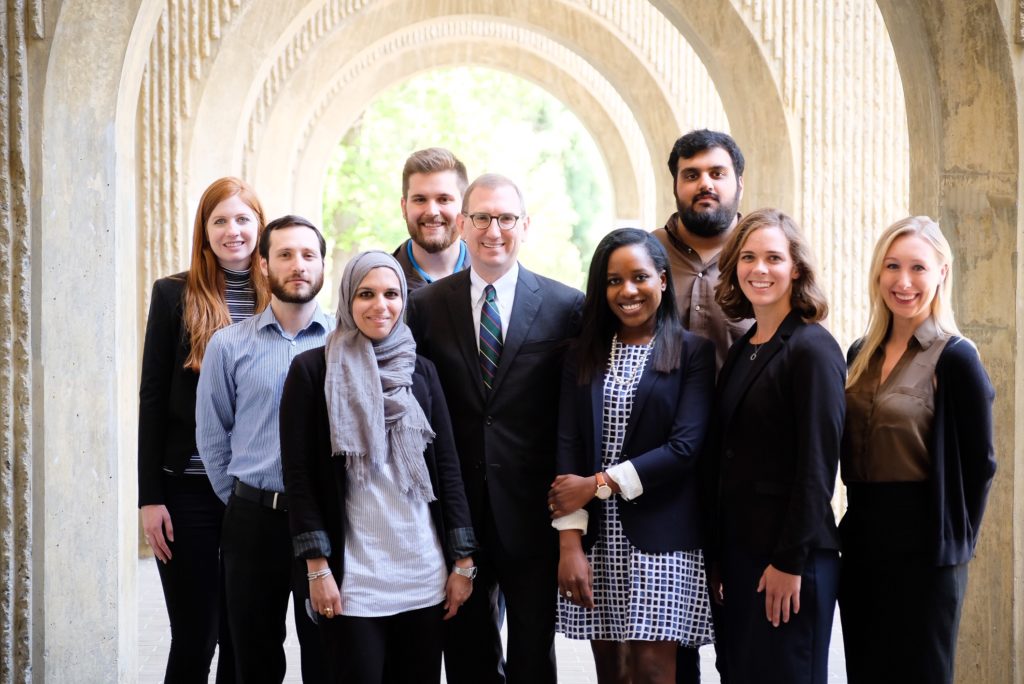Stanford Law School Religious Liberty Clinic
When Teresa Brown sought a job as a correctional officer for the State of California, she was told, in effect, that people of her faith need not apply. As a devout Seventh-day Adventist, Brown cannot work between sundown Friday and sundown Saturday. In the eyes of the state, that was disqualifying; in its view, any officer it hires for any of its 34 prisons must commit to being available at any time. No exceptions.
Now, the single mother of two is suing, claiming the failure to accommodate her faith amounts to illegal employment discrimination under the state’s own civil rights laws—laws that provide express protection for Sabbath observance in the workplace.
Brown has a powerful ally in her quest: the Stanford Law School Religious Liberty Clinic, which this spring represented her at a trial before a superior court judge in Sacramento. Among other things, students from the clinic argued that public safety surely does not require every prison guard in the state to be available every hour of every day. A decision is pending.
The clinic, now in its fifth year of operation, is the only full-time program in the country where students engage in faculty-supervised practice in that field. And it has quickly made a name for itself as a training ground for young lawyers, as well as a non-partisan voice for religious liberty.
“Our objective is to prepare aspiring lawyers for the practice and profession of law at the highest level, no matter the area they go into, while introducing, teaching, and developing an appreciation for religious liberty as a right that belongs to everyone regardless of faith or party,” says James Sonne, professor of law and the clinic’s founding director.
The clinic has represented Sikh truck drivers facing employment discrimination, Native American inmates seeking to grow their hair according to their faith, and a Muslim congregation fighting to build a mosque. It has secured tax relief for a Hare Krishna temple, protected the rights of a Christian homeless ministry, and obtained a circumcision for an inmate who awakened to his Jewish heritage while serving a life sentence.
The focus is on helping marginalized people trying to live their lives in balance with their conscience—rather than hot-button issues that fuel the “culture wars” or foster division in broader church-state controversies. Cases come from civil rights groups and religious organizations, as well as a steady stream of letters from prison inmates and others.
“It’s not that the law school has chosen sides on faith but that it sees the religion clauses in the First Amendment and what they represent as essential to our free society,” says Lance Wickman, JD ’72, general counsel of The Church of Jesus Christ of Latter-day Saints. “The fact that the law school is able to see that and make the Religious Liberty Clinic available to students is visionary. I think it has been a great augmentation to legal education at Stanford.”
Besides clients with compelling and diverse personal stories, students get broad litigation experience. They have interviewed clients in prison—and taken the depositions of Fortune 500 company managers. They have mediated cases before state and federal agencies—and handled trial-level and appellate matters in state and federal courts.
“Looking back, doing the Religious Liberty Clinic is probably the best decision I ever made in my law school career,” says Nicole Cambeiro, JD ’16, a litigation associate at O’Melveny & Myers in Los Angeles.
Cambeiro was among a group of students who worked with the Sikh Coalition, a New York-based advocacy group formed amid the backlash against minority faiths following the 9/11 attacks. The coalition was helping a group of men who lost their jobs at J.B. Hunt Transport Services, one of the nation’s largest trucking companies, for refusing to cut their hair for drug testing. Like other followers of the Sikh faith, the men believed unshorn hair was a sign of respect for the divine.

THE COALITION FILED A COMPLAINT AGAINST J.B. HUNT WITH THE U.S. EQUAL EMPLOYMENT OPPORTUNITY COMMISSION (EEOC). Even though federal law does not require hair samples for drug tests and there are other longer-range tests for drugs, such as nail sampling, the company took a hard line. When litigation appeared inevitable, the coalition recruited the clinic.
In the course of pursuing employment-discrimination claims under Title VII of the Civil Rights Act of 1964, the students sought to recover the damages the men had suffered and change the company’s policies. Cambeiro, who was at first unfamiliar with the Sikh faith, researched its history and beliefs. Through interviews, she learned the personal stories of her clients, a number of whom had left India because of sectarian violence. She and Daniel Renz, JD ’16, then represented the men and faced off against defense counsel at an EEOC hearing.
“We each took a really active role in both presenting the facts and the law of the case and cataloging for the other side the amount of damages we thought the victims suffered and what we thought would be fair and reasonable compensation,” Cambeiro says. J.B. Hunt eventually agreed to a six-figure settlement and to revamp its drug-testing policies.
The clinic’s community partner credits its advocacy as critical. “The students did incredibly high-quality work and were as committed as we were,” says Harsimran Kaur, senior counsel at the Sikh Coalition. “They gave legitimacy and weight to our case.”
One of the newest of 11 clinics offered at Stanford Law School, the Religious Liberty Clinic is just one example of how the school has become a national leader in clinical education. Some 70 percent of students now graduate with at least one full-time clinical experience, says Juliet Brodie, associate dean of clinical education and director of the Mills Legal Clinic and the Community Law Clinic. The last decade has seen a steady expansion of clinical offerings, including opportunities for students to counsel nonprofit groups on corporate law and to give legal and technical advice to inventors, along with the continuation of representation of low-income individuals, the hallmark of Stanford’s original clinics.
As with the other clinics, enrollment in the Religious Liberty Clinic is highly competitive; it offers 16 slots per year and applications far outpace availability. The clinic’s growing reputation is such that the U.S. Court of Appeals for the Ninth Circuit recently asked it to handle the appeal of an Arizona prison inmate who was convicted of a disciplinary violation and terminated from his kitchen job after he refused to work on a religious holiday. This spring, the court ruled for the client, allowing his suit to proceed under a 2000 federal law that protects the religious exercise of prisoners and other institutionalized persons.
Originally drawn by its unique status and, for some, the opportunity to broaden their own religious perspective, students now most often enroll in the Religious Liberty Clinic because of the professional opportunity and the experience they hear about from peers.
Christina Neitzey, JD ’17, says she appreciates the mission of advancing religious liberty in its “truest sense” by “celebrating and protecting all religious beliefs.” But Neitzey says she was drawn to enroll in the clinic in large part because of its reputation as a place “where you really learn to be a lawyer and get to be one while you are still a law student.”
Neitzey represented Caroline Martinez, a Seventh-day Adventist and part-time courier for FedEx, who was denied a Sabbath accommodation and demoted. Neitzey helped lead a lawsuit for Martinez in federal court. She also took two depositions and defended a third, sitting across the table from a veteran in-house FedEx lawyer each time.
“It was exciting to be thinking in the moment about how I could get the facts I need out of this person I’m deposing to help build my client’s case and tell her story,” says Neitzey, now a litigation associate at Cleary Gottlieb Steen & Hamilton in New York. “You learn to think on your feet.”
Trevor Ezell, JD ’17, a classics major in college with a passion for religious history, says the Religious Liberty Clinic was “one of the main reasons I chose to go to Stanford.”
Ezell found especially meaningful impromptu class discussions about “what it means to be a person of faith, whether that means you are a Muslim or a Hare Krishna, and how that is part of who you are and how you live your life.” And while the religion angle was personally compelling, Ezell says his colleagues held widely diverse points of view and faith perspectives, including many who shared that they had no religious affiliation at all.
Ezell also found that the clinic offered “a huge breadth of experience” from a practical learning standpoint. He helped draft a complaint for a Hare Krishna temple denied a property-tax break. He also worked on an amicus brief to the U.S. Supreme Court in support of a group of Native-American inmates who wanted to maintain unshorn hair. Ezell, who is presently a law clerk to Judge Andrew Oldham of the U.S. Court of Appeals for the Fifth Circuit, will clerk for Supreme Court Justice Neil Gorsuch in 2020.
Beyond the nuts and bolts of legal practice, the clinic also lends itself to academic study, with readings on religious liberty and First Amendment cases, as well as deep dives into different faiths and historical examples of religious tolerance. Among them is the Flushing Remonstrance, a 17th century petition against Quaker persecution that is considered a forerunner to the religious freedoms in the Bill of Rights—and then gained new relevance in an amicus brief the clinic filed in a case in New Jersey on behalf of two Quaker groups.

Students praise Sonne and Zeba Huq, clinical supervising attorney and lecturer in law, for not only their professionalism but their willingness to step aside so students get a first-chair experience. “Through their top-notch guidance and supervision, they manage to let us sit in the driver’s seat and get this incredible experience and at the same time make sure all the work coming out of the clinic is well done and is of high quality. We learn at a deep and reflective level,” Neitzey says.
Courtney Quirós, JD ’14, helped represent Pablo Manuel Diaz, a 37-year-old man serving a life sentence in Florida for a violent kidnapping. Diaz was born in Cuba to Jewish parents who did not have him circumcised as an infant because they feared political persecution. Returning to his Jewish roots through participation in a prison ministry, Diaz repeatedly asked prison officials for permission to be circumcised. He was refused.
Quirós and Paul Harold, JD ’14, traveled to the Florida Panhandle to interview their imprisoned client and gather information for a possible lawsuit. His sincerity of faith and longing for reconciliation with it were strikingly apparent. The students also worked with a local newspaper to publish an article about the case and found a rabbi willing to perform the brit milah procedure free of charge. The strategies ultimately led the prison to change its mind, and the client was able to fulfill the command of his faith.
“I think sometimes people lack the sort of cultural imagination for why we think this is so important and why religious accommodations are so important,” says Quirós, now a securities litigation associate at Alston & Bird in Atlanta. “They don’t see it as one of our fundamental rights under the Constitution and really protecting liberty for everyone.”
In the end, Sonne credits the clinic’s success to its application of the core pedagogies of clinical legal education in a field of deep and abiding human importance that is often misunderstood or overlooked amid the noise of contemporary life—and cries out for great lawyering. Plus, he says, “the diversity, brilliance, and energy of our students make it a singular joy to be a part of.” SL
Rick Schmitt, an attorney and former staff writer for the Wall Street Journal and Los Angeles Times, is a freelance writer based in Washington, D.C.
